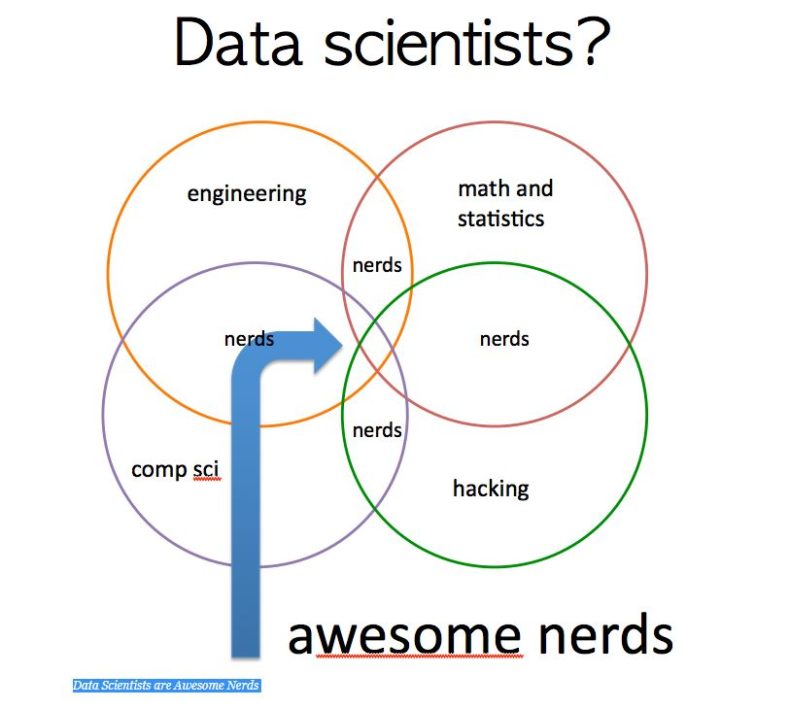“There’s been a lot of talk about driverless cars at this [artificial intelligence] conference but has anybody thought about what happens when someone puts a weapon on one of these things?…”, said Michael Nova, in June, at the O’Reilly Artificial Intelligence Conference.
Nova is Chief Innovation Officer at Pathway Genomics, a DNA testing lab, where his speciality is using Big Data and Artificial Intelligence to scrape patient information together to make personalised recommendations. If you have degrees in biochemistry, physics and medicine, as Nova does, your mind has the freedom and legitimacy to go pretty much wherever it wants. But he was making the point that an awful lot of stuff is going on “because we can” rather than “because we should”. It’s symptomatic of what Hilary Mason, chief data scientist at bitly calls the rise of “The Awesome Nerd”: the crossover character in the Venn Diagram of engineer, mathematician, computer scientist and hacker that is changing the world.

I was attending the conference mainly to get some colour for the final chapters of my book “Man Vs Big Data”. I wanted to find out what the cutting-edge experts were thinking and doing now. If they hadn’t been talking so much through their cheek mikes they might have been mistaken for mime artists; the uniform of The Awesome Nerd is black t-shirt, black jeans and black boots. And as these presenters leaped across the stage it became abundantly clear they were telling us the results of problems they’d solved two years ago – they weren’t going to reveal the new stuff.
Even so, for the casual observer, last years’ news was scary enough. What’s more, the ANs were still pretty excited by it; “If you have a billion products and a billion users, that’s a billion by a billion matrix. How do we sort through that and show you the right things? Well here’s the equation!!!” announced the guy from Facebook. These nerds weren’t just awesome they were quite excitable as well. And no wonder. This exciting thing, the harvesting and analysis of human information – or ‘Big Data’ – has already penetrated deep into our lives, sometimes overtly and sometimes imperceptibly.
Rana el Kaliouby, cofounder and CEO of Affectiva, did give us a glimpse of the next big thing: integrated facial recognition technology, which captures and learns from our data. Kaliouby demonstrated how they used it to circumnavigate the problem of focus groups influencing each other. For one project, instead of using groups, they showed individuals a sitcom and tracked the participants’ likes and dislikes about the show through their facial twitches. A neat graph showed how two particular characters caused noticeable negative reactions; the two actors were fired. “Maybe that wasn’t the best example,” she summarised coyly.
Clearly, there are benefits to Big Data and how it is applied, but it is also raising ethical questions. When, thanks to the union of Big Data and AI, a machine begins to show human-level intelligence, would we have the right to shut it down? Is cancelling out that existence akin to taking a life? Equally, if a robot injures someone, who is, legally, to blame?; the robot, the owner, or the manufacturer?
For once, we appear to be ahead of the game in thinking about these questions; the European Parliament has begun the process of creating an ethical legal framework to ask not only what kind of things we could be doing in the new digital ocean, but also what kind of things we should be doing there. According Luciano Floridi, professor of philosophy and information at the University of Oxford, “we are stuck with the wrong conceptual framework… We need less science fiction and more philosophy.”
But its not clear anyone’s told the Awesome Nerds yet. They are too busy working out how your car can tell your fridge to lock itself because you have had a stressful day and should be denied a glass of wine – the machines having decided that it wouldn’t be good for you in your current state of mind.
In the meantime, the benefits of Big Data will be many and tangible: new jobs, new products, new services and deeper insights into the world around us. More efficient businesses making cheaper goods available will deliver experiences many people could have only dreamed of a generation ago. Big Data holds out the possibility of personalised medicine – cheaper and more effective healthcare with earlier and more accurate diagnoses than a human doctor might provide – as well as responsive, self-organising cities.
All this data will help us work out whether we should or could run a marathon, who we should date – and mate – while making DNA sequencing routine. Further advances in science (and maybe new branches of science) will be created from Big Data; physics and genetics is in the process of being transformed by it. It will refine our understanding of who we are and how we got here. It’s going to be an exciting ride – with the Awesome Nerds at the controls.


